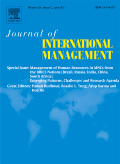
The Impact of Psychic Distance on Subsidiary Autonomy - Theory and Evidence from Central and Eastern European Countries
The key objective of this study is to determine whether or not psychic distance between home and host countries influences the decision-making autonomy of subsidiaries. Theoretical arguments for the relationship between psychic distance and subsidiary autonomy go in both directions with some predicting a negative relationship and others predicting a positive one. We test these conflicting hypotheses with a unique multi-country and multi-industry database reporting survey evidence of 809 subsidiaries located in five Central and Eastern European countries that serve headquarters in 44 different nation states. Psychic distance is a multidimensional construct and measured in terms of linguistic, religious, economic, institutional and geographic distance. The empirical results of 103 country pairs suggest that psychic distance – in terms of religious and economic distance – is positively related to autonomy.





